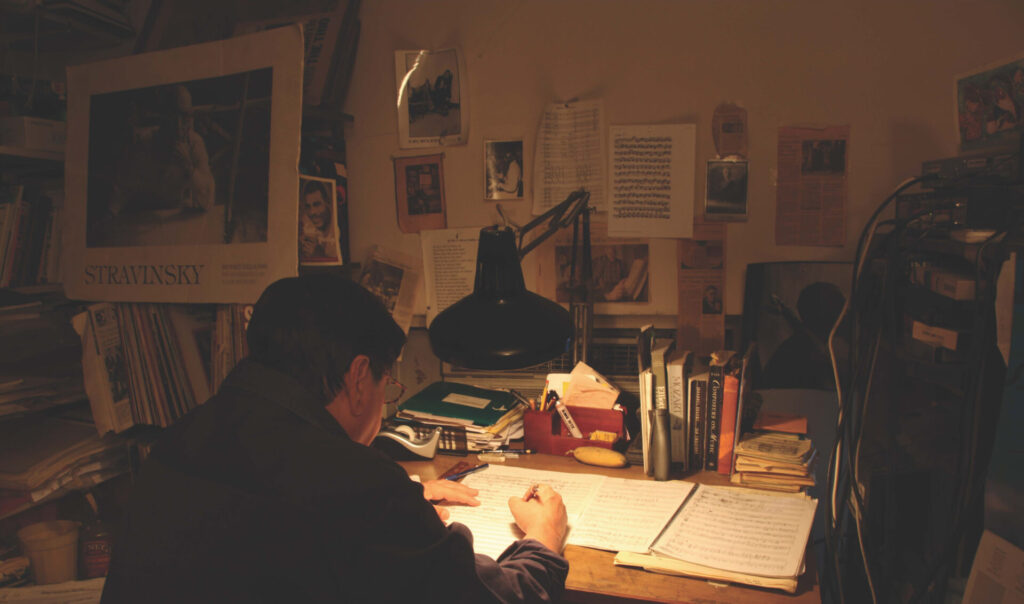Headlines
Composer Donates Scores to Blues Archive

By Lauren Rogers
University of Mississippi

Baltimore composer Larry Hoffman has donated a dozen of his musical scores to the Blues Archive at the University of Mississippi.
While Hoffman has written many more works, the award-winning composer chose his blues- and American folk-infused classical compositions for the acclaimed collection.
“It is with great pride that I donate these scores to the Blues Archive at the University of Mississippi,” Hoffman said. “It is at once an honor, a vindication and a great encouragement.”
Greg Johnson, professor and curator of the Blues Archive at the J.D. Williams Library, has been familiar with Hoffman’s work for several years.
“I first discovered Larry’s music on a compilation album from the late 1980s called ‘Prelude in Blue,'” Johnson said. “The album caught my eye, because it was a classical music LP in one of the Blues Archive collections. I don’t remember the other pieces on the record, but was struck by Larry’s ‘Blues for Harp, Oboe and Violoncello,’ as it featured world-famous harpist Yolanda Kondonassis and oboist John Mack.
“Years later, Living Blues magazine asked me to review Larry’s album ‘Works of Larry Hoffman: Contemporary American Music.’ With each of us having interests in the worlds of blues and classical music, we had a lot to talk about!”
From a young age, Hoffman was really into American folk music, listening to – and later playing –music of the Weavers, Joan Baez, Bob Dylan and the Everly Brothers. This grew into a passion for the blues. As a professional folk singer, Hoffman played for “Mississippi” John Hurt and with Skip James and other bluesmen.
He also began his first formal study of music with jazz great John Coltrane’s teacher, Dennis Sandole. He later found a deep love for the music of Brahms, leading him to earn a master’s degree in music theory and composition at the Peabody Conservatory of Music.
A large part of his compositional style melds these seemingly disparate genres.
“My initial mission to become a composer was to infuse the contemporary classical language with the great power and dignity of the blues – if I could find a way,” Hoffman said. “Folk music has inspired many composers, among them Bela Bartok, Leos Janacek – even as far back as Brahms, Mozart and Haydn.”
But blues is rarely represented in American concert music, he noted.
“Sadly, there is often prejudice against this integration in both the blues and classical worlds,” Hoffman noted. “And yet, when I have been present at concerts where my blues-inspired pieces were programed among serious works of the classical masters, audiences have uniformly shown a great appreciation of this blend of ideas.”
Hoffman’s music is helping to bridge that divide, Johnson said.
“While writing for typical classical ensemble configurations like the string quartet or symphony orchestra, he melds classical syntax with blues and folk phrasing and general aesthetic,” Johnson explained. “Composers have explored the blues through a classical music lens before, in works like William Russo’s ‘Three Pieces for Blues Band and Orchestra’ (1968), but Larry is the most successful at fusing these genres without simple mimicry or blatant stereotypes.”
Besides his work as a composer, Larry Hoffman has written about the blues in publications such as Guitar Player, Living Blues, Blues Revue and the Baltimore Sun.
He was the principal writer for the liner notes to 2003 “Martin Scorsese Presents the Blues” box set (Sony/Universal), which won Grammy Awards for “Best Liner Notes of the Year” and “Best Historical Compilation of the Year.” He was also nominated for a Grammy for his writings in the “Mean Old World: The Blues from 1940-1994” (Smithsonian) box set.
As a producer, Hoffman has received three Living Blues Critics’ Awards for “Best Producer of the Year: New Recordings” (1998), “Best Producer/Compiler of the Year: Historical Recordings” (1997) and “Best Liner Notes: Blues Releases” (1996). He also received a W.C. Handy Award for producing the “Best Acoustic Record of the Year” for Corey Harris’ “Fish Ain’t Bitin'” (1998).
The scores donated by Hoffman are valuable additions to the archive, Johnson said.
“When I’m introducing new audiences to the blues, I often speak about its influence on other styles of music,” he said. “I think Larry’s compositions provide an interesting point of connection in speaking to some music students who have mostly been immersed in classical training. I think these compositions help demonstrate the reach of the blues outside typical spheres of influence.
“I also hope we can get some faculty and students in the Department of Music to program some of these pieces in future performances.”






















































